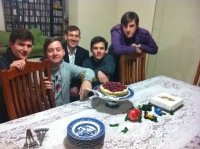Would you like to share a day in your unschooling life? Not a Typical Day. But just a day.
Today?
Here is a day from last week....
Three older sons are home for study week for university. I and one son get up
early to workout then others start waking up. My second son Greg, a postulant for the
Conventual Franciscans and in Chicago for postulancy and novitiate for two
years, phoned to talk so we all take turns chatting. It's getting cold there...
And summer is starting here! Contrasts!
We talk a lot about the movie Midnight in Paris with Owen Wilson, the 1920s art
and literature references. Kids get breakfasts and do workouts and as Anthony,
our high school age unschooler, eats some fruit cake and cheese for breakfast I
remark that the cake was marked down at our local independent grocer. He says he
will walk down now and get another at that price (99c!) and count the walk as
fitness for today.
I start in on work for my Kumon Education Centre and also discuss food and
recipes as the older ones are doing a cook off with friends from university. They look
through our cook books for ideas.
I keep up my work while chatting. Anthony comes back from the store and we talk
about Blessed John Scotus ( tomorrow! A Franciscan! A philosopher! The doctrine
of the Immaculate Conception) and Marie Curie ( would be her 144th birthday
today).
I ask Anthony to sort the laundry and perhaps do some maths and Physics. He does
the washing and maths and is sitting on the sofa about to look at his Saxon Physics text, leftover from hid older brothers, when his friend's dad arrives to take him to games at a friend's house. We
alternate houses for games on Mondays.
I go to mass at university with one son who is dropping off an assignment. I visit the
university library for philosophy books for my essay and find a book called Philosophy
and Movies... I borrow this for Anthony as he, like all of us, love movies and we
can read and discuss the related philosophical discussion together.
I rush some lunch at home and go to pick up Anthony and his friend to bring them
to work for me at Kumon. Three other sons arrange to meet me there. I discuss an
afternoon women's retreat with my friend when picking up the kids... Can we both
go?
We work at Kumon 2.30-8pm then some sons go to Theology on Tap ( George Wiegel)
and some sons and two of my Kumon assistants and I got to 7 Eleven for our free
slurpies because today is 7/11! We pick up a DVD from the rental on the way
home.
Leftover for dinners, the kids watch a DVD, Anthony practices piano and begins
writing for Nanowrimo as he and his friend and I were chatting about this in the
car. I do work for the MI (Militia Of the Immaculate) and talk to others about
Wiegel when they get home from TOT.
So that's Monday's Unschooling day!












